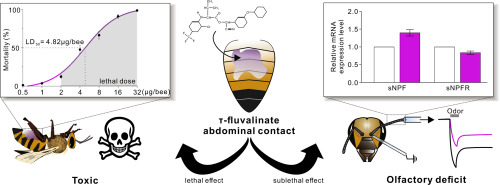当前位置:
X-MOL 学术
›
Pestic. Biochem. Phys.
›
论文详情
Our official English website, www.x-mol.net, welcomes your feedback! (Note: you will need to create a separate account there.)
Abdominal contact of fluvalinate induces olfactory deficit in Apis mellifera
Pesticide Biochemistry and Physiology ( IF 4.7 ) Pub Date : 2020-03-01 , DOI: 10.1016/j.pestbp.2020.02.005 Sooho Lim , Ural Yunusbaev , Rustem Ilyasov , Hyun Sook Lee , Hyung Wook Kwon
Pesticide Biochemistry and Physiology ( IF 4.7 ) Pub Date : 2020-03-01 , DOI: 10.1016/j.pestbp.2020.02.005 Sooho Lim , Ural Yunusbaev , Rustem Ilyasov , Hyun Sook Lee , Hyung Wook Kwon

|
τ-Fluvalinate (fluvalinate) is a highly selective pyrethroid insecticide compound used for controlling ectoparasitic mites that cause major damages in honey bee colonies. Although honey bees have resistance and low toxicity to this xenobiotic chemical, little is known about the effects of this chemical on sensory modulation and behaviors in honey bees. Here we addressed the effect on olfactory cognition at the behavioral, molecular, and neurophysiological levels. First, we found that topical application of fluvalinate to honeybee abdomen elicited somewhat severe toxicity to honey bees. Furthermore, honeybees treated with sublethal doses of fluvalinate showed a significant decrease in olfactory responses. At the molecular level, there was no change in gene expression levels of odorant receptor co-receptor (Orco), which is important for electrical conductivity induced by odorant binding in insects. Rather, small neuropeptide F (sNPF) signaling pathway was involved in olfactory fluctuation after treatment of fluvalinate. This indicates that olfactory deficits by abdominal contact of fluvalinate may stem from various internal molecular pathways in honey bees.
中文翻译:

氟缬草酸的腹部接触诱导蜜蜂嗅觉缺陷
τ-Fluvalinate (fluvalinate) 是一种高选择性拟除虫菊酯杀虫剂化合物,用于控制对蜜蜂群造成重大损害的外寄生螨。尽管蜜蜂对这种外源化学物质具有抗性和低毒性,但人们对这种化学物质对蜜蜂感官调节和行为的影响知之甚少。在这里,我们讨论了行为、分子和神经生理学层面对嗅觉认知的影响。首先,我们发现在蜜蜂腹部局部应用氟苯丙胺会引起对蜜蜂的严重毒性。此外,用亚致死剂量氟缬草酸盐处理的蜜蜂的嗅觉反应显着降低。在分子水平上,气味受体共受体(Orco)的基因表达水平没有变化,这对于昆虫中气味结合引起的导电性很重要。相反,小神经肽 F (sNPF) 信号通路参与了氟缬草酸治疗后的嗅觉波动。这表明通过腹部接触氟胺草酸盐引起的嗅觉缺陷可能源于蜜蜂的各种内部分子途径。
更新日期:2020-03-01
中文翻译:

氟缬草酸的腹部接触诱导蜜蜂嗅觉缺陷
τ-Fluvalinate (fluvalinate) 是一种高选择性拟除虫菊酯杀虫剂化合物,用于控制对蜜蜂群造成重大损害的外寄生螨。尽管蜜蜂对这种外源化学物质具有抗性和低毒性,但人们对这种化学物质对蜜蜂感官调节和行为的影响知之甚少。在这里,我们讨论了行为、分子和神经生理学层面对嗅觉认知的影响。首先,我们发现在蜜蜂腹部局部应用氟苯丙胺会引起对蜜蜂的严重毒性。此外,用亚致死剂量氟缬草酸盐处理的蜜蜂的嗅觉反应显着降低。在分子水平上,气味受体共受体(Orco)的基因表达水平没有变化,这对于昆虫中气味结合引起的导电性很重要。相反,小神经肽 F (sNPF) 信号通路参与了氟缬草酸治疗后的嗅觉波动。这表明通过腹部接触氟胺草酸盐引起的嗅觉缺陷可能源于蜜蜂的各种内部分子途径。



























 京公网安备 11010802027423号
京公网安备 11010802027423号